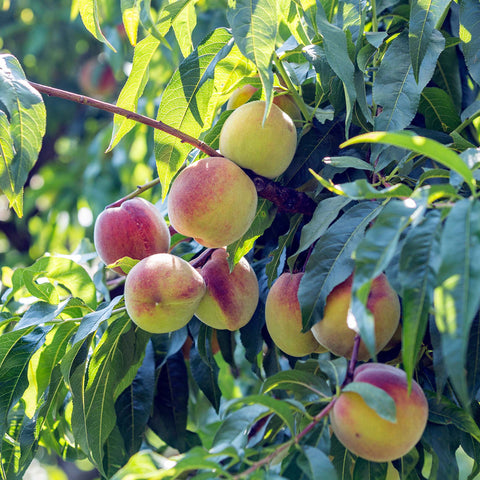Backyard Fruit Trees for Beginners
If you are looking for the best place to buy fruit trees online look no further! Growing your own fruits in your own backyard is one of life’s simple pleasures. However, some types of fruit trees can be challenging to grow – what with pests, diseases, and specialized cultivation requirements. Here, though, we introduce some of the easiest backyard fruit trees for beginners and backyard orchardists to maintain: Pear trees, apple trees, fig trees, and citrus fruits. Slightly more challenging, but still within the capabilities of the part time amateur orchardist are plum trees, cherries, and peach trees. Stone fruits are a great choice for any home gardener to start growing right from their backyard!
The best time to plant fruit trees is in early spring so they have the whole growing season to establish their tree root systems. Some garden fruit trees can tolerate a fall planting if they are fast growers. Most trees require full sun to set fruit crops. Be sure to regulate soil conditions with newly planted trees
For more specific information on how to grow fruit trees, head over to our Grow Guides pages. Start enjoying delicious fruit in no time!
Most Popular Fruit Trees




Pear Trees
 Pears are THE easiest fruit to grow on a tree! The round, gritty “sand pears” (derived from Asian pears) are among the easiest fruit bearing trees to grow. You can sometimes see old sand pear trees still gamely producing pears in southern homesteads long after the house itself has crumbled. The pears you see in the grocery store are European pears and you can grow them too.
Pears are THE easiest fruit to grow on a tree! The round, gritty “sand pears” (derived from Asian pears) are among the easiest fruit bearing trees to grow. You can sometimes see old sand pear trees still gamely producing pears in southern homesteads long after the house itself has crumbled. The pears you see in the grocery store are European pears and you can grow them too.Except for their susceptibility to fire blight, which causes stem tips to turn black and die, pears are almost disease-free, and do not need a regular spraying program as do many other fruit trees. Pear trees do not take well to transplanting so choose a long term planting site.
The ‘Kieffer’ pear is resistant to fire blight and a good choice everywhere in the continental United States. ‘Kieffer’, like most pear fruit varieties, are self-fertile, but you get better production if you have two cultivars for cross-pollination. The popular ‘Hood’ pear is a good choice for southern orchards. Don’t overlook the new Asian pears. These are hardy in the North, disease-resistant, and generally begin bearing fruit at an early age as a young tree.
Learn the “chill hours” for your area and select varieties adapted to your climate. Check out our Pear Grow Guide for more on pear trees.
Apple Trees
 Beautiful view of an apple orchard on a sunny autumn day. Apples are only slightly more difficult to grow than pears. Perfect Plants offers eight different apple tree varieties to choose from.
Beautiful view of an apple orchard on a sunny autumn day. Apples are only slightly more difficult to grow than pears. Perfect Plants offers eight different apple tree varieties to choose from.Our favorite varieties include ‘Anna’, ‘Ein Shemer’, and ‘Dorset Golden’ for the South; and ‘Fuji’ and ‘Granny Smith’ for more northern climates. If you are looking for a self fertile apple tree check out the Golden Delicious!
Apple trees go through a dormant season so you need to know your local “chill hours” and hardiness zone (they are not the same) and check out the Apple Tree Grow Guide for information on how to grow apple varieties.
Fig Trees
 Fig trees from nursery produced heavy crops this past summer. The trees were loaded! Fig trees may well be the easiest fruit trees of all to grow as they are disease-free, drought tolerant, heat tolerant, fairly cold hardy, early bearing, and self-pollinating. If you are looking for a fast growing fruit tree this is it!
Fig trees from nursery produced heavy crops this past summer. The trees were loaded! Fig trees may well be the easiest fruit trees of all to grow as they are disease-free, drought tolerant, heat tolerant, fairly cold hardy, early bearing, and self-pollinating. If you are looking for a fast growing fruit tree this is it!We also have semi dwarf fruit tree varieties if you need a small fruit tree to grow in small space that will still produce full size fruit. They are perfect as potted plants! Some fig trees will stay compact at 5-15 feet tall as mature trees. A self-pollinating fruit tree variety means it does not need a second tree to cross pollinate and have trees produce fruit.
The ‘Brown Turkey’ Fig tree is one of our favorites. It grows fast, gets large, is highly productive, and it is more cold weather hardy (to USDA zone 7) than most other fig varieties. If you live further Up North, the ‘Chicago Hardy’ fig is your best choice; it will survive in zone 5!
Citrus Trees
If your garden is in USDA zones 8 through 11, you can grow citrus fruits. Tangerine trees (aka mandarins), orange trees, grapefruit trees, kumquat trees, lemon trees, and lime trees are all very easy to grow.Citrus fruit trees are drought-tolerant, self-pollinating, and disease-free. Unfortunately, due to agricultural laws, we cannot ship citrus trees out of the state. Citrus fruits do not handle extreme freezes well so if you live in an area with exceptionally cold winters then consider growing in containers.
Peach Trees
 Peach trees are a great choice for slightly advanced beginner gardeners. They can thrive in USDA grow zones 5-9, making them suitable for a wide range of climates. Peach trees are adaptable, forgiving of different soil conditions, and relatively low maintenance. They require full sun but can tolerate partial shade. Regular watering and proper pruning are important, but both can be easily learned. Peach trees offer a rewarding experience with beautiful blossoms in spring and a bountiful harvest of juicy peaches in the summer. Their manageable size makes them easier to maintain and harvest compared to larger fruit trees. Overall, peach trees are a beginner-friendly option for those looking to add a fruitful addition to their backyard garden.
Peach trees are a great choice for slightly advanced beginner gardeners. They can thrive in USDA grow zones 5-9, making them suitable for a wide range of climates. Peach trees are adaptable, forgiving of different soil conditions, and relatively low maintenance. They require full sun but can tolerate partial shade. Regular watering and proper pruning are important, but both can be easily learned. Peach trees offer a rewarding experience with beautiful blossoms in spring and a bountiful harvest of juicy peaches in the summer. Their manageable size makes them easier to maintain and harvest compared to larger fruit trees. Overall, peach trees are a beginner-friendly option for those looking to add a fruitful addition to their backyard garden.
Some examples of fruit trees that are friendly for relative beginners are the White Lady Peach, Reliance Peach, and Contender Peach. These varieties are self-pollinating, meaning they do not require another tree for fruit production, although some varieties may benefit from a companion tree for increased fruit yield. Nevertheless, all three types are capable of producing fruit on their own.
For more information on how to plant these fruit trees, you can go to their specific grow guides that we have curated! There you will find more information on planting each specific fruit tree, how to dig the hole, loosen the root ball, get rid of air pockets, and fill the hole with soil. It is a good idea to fertilize your fruit trees annually at the base of the tree trunk for the best growth and production. Grape vines are also an easy, self fertile fruit tree to grow for beginners. Some examples of beginner-friendly grape vines to grow are Niagara Grape and Catawba Grape.
Fruit tree care is not complicated and the growing guides will help guide you. You may have some container fruit trees on your patio or front porch if you do not have a yard. Fruit trees in pots will require good drainage holes so the plants do not get wet feet or shallow root rot. Be sure to use nutrient rich potting soil to keep your trees flourishing. We have our very own Fruit Tree Planting Mix specially formulated for fruit trees. Our fruit tree nursery produces and ships high quality plants that you will be pleased with.
Shop all fruit trees for sale to see our availability and start a fruit orchard of your own. These are dwarf trees that have been grafted onto high root stock. They are rooted in their nursery container with soil and are NOT bare root trees.
Most of these fruit trees in Florida and surrounding states will do well with fruit production because of the warm climate. Be sure to check your USDA growing zone before buying fruit trees online. Backyard fruit trees are a way to get the whole family involved in home gardening and spending time outside besides the vegetable garden! Check out Fruit Trees for the Midwest.
What kinds of fruit trees have you had success growing? Let us know in the comments!






















